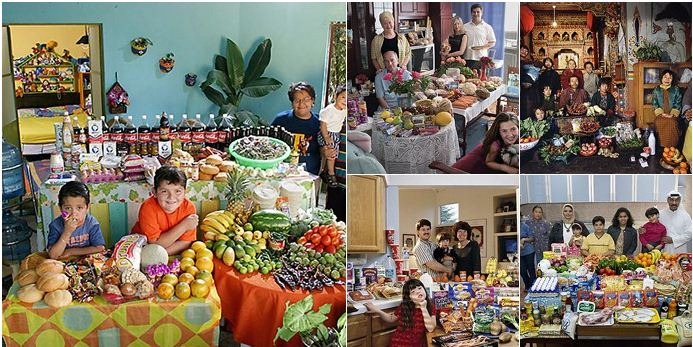FOOD ISSUES MONTH – THE FIRST WEEK…
This first week has seen a lot of action, activities, suggestions and talking points from teachers around the world. We’re really pleased with the reception. It’s a good moment to take stock of some of the things that have been shared and to encourage you to keep going!
From the blog –
Bill Templar and David Royal shared some good critical readings on food and junk food, as well as food addiction. You can find these in the first two comments.
David Royal also shared some lesson ideas on food issues. You may wish to check out his What the World Eats lesson, that can be used with the Hungry Planet food images above. http://www.esletc.com/2008/03/30/what-the-world-eats/
Also in the comments is an interesting anecdote about MSG (again from Bill Templar), obviously this relates to food safety – an important issue.
GISIG committee member M. Iqbal shares information about lunch traditions in different parts of the world, in particular the dabbawala system of lunch deliveries. He invites us to share other similar stories and how English is connected to this.
Louise Guyett in Dublin shared with us how she has already been using some of the resources and topics mentioned. She posted some photos of the results from her class on the Facebook page.
Check out our main sharing page here at the site to see these in more detail.
On Facebook
The Facebook event for Food Issues Month saw a lot of action during this week. Here are some of the lesson plans and activities that were shared, with links.
Kieran Donaghy, of the award-winning Film English site, shared a lesson about Coca Cola ads http://film-english.com/2013/10/07/coca-cola-ad/.
Milada Krajewska, Nicky Hockly, Raquel Gonzaga, Adam Beale, Maria Theologidou, Beata Palínska, Rosali Serra, Helen Strong, Jamie Keddie, Jeffrey Doonan, Antonia Clare, Priscilla Mateini and Ceri Jones shared some great links to videos and websites dealing with various food issues. The great content curator Carla Arena has started a Pinterest where we can pin all the great links that are being shared. http://www.pinterest.com/carlaarena/food-issues/
Rachel Roberts shares a lesson on chicken nuggets experiments (amazing stuff) here http://elt-resourceful.com/
Jennifer Verschoor got her 8 year old students to share material about local food in Argentina http://www.pimpampum.net/
The great folks over at eltpics are sharing a collection of images you can use to teach food issues with here http://www.flickr.com/photos/
Sean Banville, the man behind Breaking News English, has done a free lesson plan on hunger http://www.breakingnewsenglish.com/1310/131003-world-hunger.html
Josh Round is starting a team project at his school in London relating to Food Issues month – using this as part of CPD. http://
Kyriaki Deroukaki has a very interesting experimental lesson on the importance of communication with food https://docs.google.com/
Linda Ruas has put together lesson material on Food from the New Internationalist. http://eewiki.newint.org/index.php/READY_LESSON_FOR_INTERMEDIATE_LEARNERS:_FOOD_FOR_THE_WORLD
Svetlana Skapenker shares her lesson http://
Jamie Keddie share two food-related lessons on local food at his lessonstream site http://lessonstream.org/2010/01/31/an-unusual-recipe/ and http://lessonstream.org/2007/11/30/spaghetti-harvest/
Finally, the British Council TeachingEnglish website has joined in as well https://
On Twitter, there are lots and lots of links being share as well. Please check #foodissuesmonth to see them all.
Discussion
Over at the Global Issues discussion forum, there have been several interesting things shared and talked about. Bill Templar and M. Iqbal have been the most prolific finders of great thought-provoking content: from fast-food working conditions to giant food corporations to brain food myths to agriculture and agribusiness to food choices. The GISIG discussion forum can be found here.
On to week 2…
A huge thank you to everyone for sharing so much so far. Let’s see what else comes up during the month, and hear about teachers’ experiences with these lessons and issues.


Comments are closed.